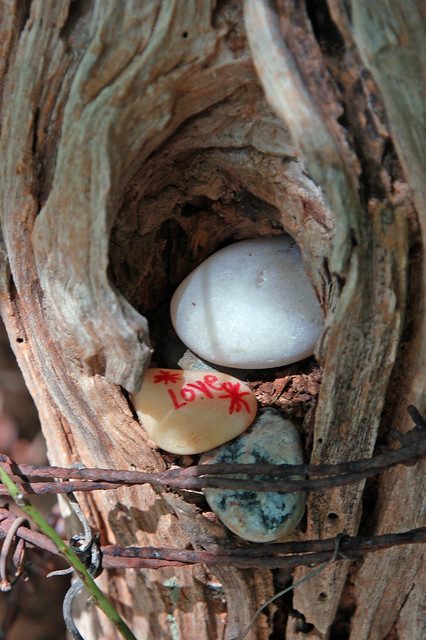
When I visit Martha's Vineyard, I usually wander by the plaque commemorating "Rebecca, Woman of Africa" on the trail to Great Bight. It's hard to read the historical text in the shadows; here is what it says:
The marker is on an "African American Heritage Trail"; more beach-goers than tourists likely trek by the plaque. According to trail information, Rebecca actually bore two boys, Cato and Pero, as well as Nancy Michael -- and land holding and inheritance records suggest that none of them were the offspring of Mr. Amos, though that is not completely clear about the boys. It also appears that Rebecca continued in slavery as the property of farmer Charles Bassett and his heirs until her death. There is no record of her emancipation despite the text of the plaque; records show her children Nancy and Pero were sold off after Bassett's death to another farmer.Born in Africa and enslaved in Chilmark, she married Elisha Amos, a Wampanoag man. She was the mother of Nancy Michael. Rebecca died a free woman in this place in 1801.
I wonder, did Nancy Michael, Pero and Cato have children? If so, do any descendants identify as "African"? Or do they think of themselves as members of the local native tribe, as "Indians," since their mother's marriage, if not their paternity, was widely acknowledged?
All this reminded me of questions raised in the fascinating story of Michelle Obama's white ancestors. DNA testing and intensive study of old records are revealing that throughout U.S. history the "races" have never been so rigidly separated as the old "one drop of blood makes a Negro" standard that we lived under so long would have suggested. Recognizing our kinship is not simple.
The article reports that Black folks -- including the apparently violated women -- were no more willing in the years after emancipation to talk about what had happened under slavery than were the children of the white masters. Is this a bit of exploring that we need to do as a nation, now that the research has become somewhat more possible? I like that idea; it could sure make us let attached to rigid racial categories.The discovery [by a white family that a relative had fathered a mixed son] comes as an increasing number of Americans, black and white, confront their own family histories, taking advantage of widespread access to DNA testing and online genealogical records. Jennifer L. Hochschild, a professor of African and African-American studies at Harvard who has studied the impact of DNA testing on racial identity, said this was uncharted territory.
“This is a whole new social arena,” Professor Hochschild said. “We don’t have an etiquette for this. We don’t have social norms.”
“More or less every white person knows that slave owners raped slaves,” she continued. “But my great-grandfather? People don’t know what they feel. They don’t know what they’re supposed to feel. I think it’s really hard.”

This offering nestled in a tree next to Rebecca's marker.
3 comments:
Excellent post!!!! My ancestors were Quakers and anti- slavery -- and, according to family legend, there are a few drops of Native American blood in my old veins.
It is humorous to me that people are not ashamed or reticent about acknowledging "native American" blood nowadays. Someone once told me when I was a child that my grandpa was part Indian -- and my grandpa did look as though he might have been part Indian. I told my mother what that someone had said to me and my mother got very upset and said it was not true. Being a "half-breed" was not then anything to admit to proudly, although as a child I thought it was neat to think I might be part Indian. Many years later, when one of my younger brothers was trying to get into medical school, he tried to find out if we were indeed part Indian as that would qualify him for affirmative action (priority) status for enrollment. I do not think he was successful in finding any proof, however, one of our cousins is now doing our family tree and it turns out we may have some Sac and Fox blood after all.
Perhaps in the future we Americans will have evolved enough to admit that rapes happened and to acknowledge multi-racial relationships. My maternal relatives arrived well after the Civil War and my paternal relatives were literally dirt-poor and probably never owned a slave, but if it would turn out that we had black relatives, it would not be the end of the world to me -- although I would definitely apologize to them for something an ancestor of mine did. What else could I do?
The story of Nancy Michael's family is complex. She did have two daughters and one grandson.
Nancy's father was Sharper Michael, a slave who died in the Revolutionary War. He couldn't marry Rebecca, as both were slaves, but they had several children together before "marrying" Indians -- Rebecca to the widower Elisha Amos, and Sharper to Lucy Peters, apparently an Indian widow. Sharper and Lucy had children together as well.
Years later one of their descendants had to go to court to prove Sharper and Lucy were legally married.
Post a Comment